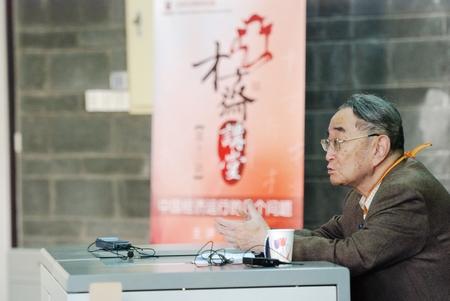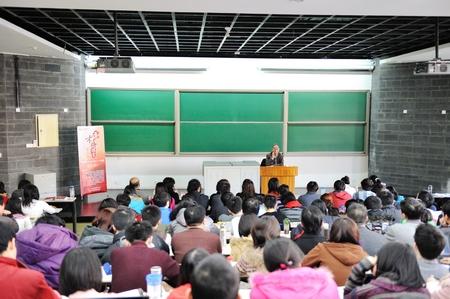Peking University, Mar. 2, 2011: A lecture was successfully held in Peking University (PKU) on the morning of February 24, focused on China's current economic policies, as well as some institutional problem of the huge market. Professor Li Yining, director of PKU s Faculty of Social Sciences and honorary president of Guanghua School of Management, addressed the speech. As the 11th stanza of the Lectures on Research Studies for Graduate Students (also called Caizhai Jiangtang), this lecture was sponsored by PKU Graduate School, and chaired by Professor Wang Enge, provost of PKU.

Prof. Li Yining, delivering his lecture
During the two-hour speech, Professor Li made a penetrating analysis on the structural adjustment, inflation, employment, innovation, urban-rural integration and economic growth, delineating a panorama of China's temporary economic operation. Many of these problems could never be solved without the concrete practice of reform and development, which he kept accentuating in this lecture.
"Actually, the structure of GDP stands much more crucial than GDP itself," said Li. In the eyes of this 80-year-old professor, it was still not the right time to be too excited about China's economic growth, even considering the fact that China just exceeded Japan at the stage of global economy last year. What impressed him most when visiting Japan a few years ago were the fully intellectualized and modernized household products. And still worse, today s China is suffering a lot with the weak human resources.
As to inflation, which caused the most attention, Professor Li held the opinion that China's inflation is the comprehensive result of demand-pull, cost-push and imported inflation, in which cost-push makes the core and is well worth studying. In his view, there are several reasons leading to the current cost-push inflation in the country, such as the severe global shortage of raw materials and the increase of land prices.
Li also gave some suggestions on employment, expansion of domestic demand and economic development of the nation. At the present stage, the economic growth needs to stay above 8% as he expected. Besides, since 75% of the labor force is assimilated by private enterprises, he proposed that the government makes great efforts to nurture and develop micro-enterprises to solve these problems. Furthermore, he called on more attention to livelihood issues, especially the income inequality.

Prof.Li and his audience
"It is the responsibility of the state to catalyze non-governmental resources." With strong confidence and expectation in China's economy, Professor Li concluded the inspiring speech, elevating the whole audience.
Translated by: Wang Shiqin
Edited by: Jin Ludi
Source: PKU News (Chinese)
Related News
Photos
More>>history
- Unveiling Ceremony of Confucius Institute of Moscow State University Held
- Chomsky Receives PKU Honorary Doctorate, His Lecture Depicts World Order
- Strategy for Global Partnerships
- PKU President Zhou Qifeng Attends New York Alumni Association Annual Meeting
- U.S. Council of Foreign Relations President Richard Haass Speaks at PKU





